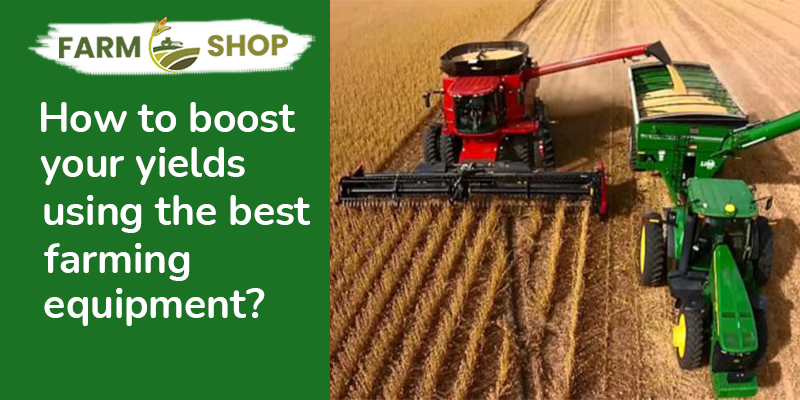With the rise in the global population, the need to increase the production of food is putting high pressure on the farmers to provide better yield. It requires efficiency as well as sustainability in farming while using the best farming equipment. Whether you are using standard closing wheels, grain temperature monitoring systems, or other agriculture equipment, the purpose is to get higher yields and higher quality grain. Apart from the genetically modified hybrids, hi-tech devices and smart farming practices have contributed towards increasing farm produce. Due to advanced technology, farmers can now analyze the condition of the soil, weather forecasts, nutrients deficiency of the soil, right time for planting, etc. Nowadays, technology and science play a crucial role in farming to grow higher crop production.
The activities adopted by the farmers are directly or indirectly linked to the farm production achieved. Every decision taken by the farmer depends upon their experience, analysis, and study of the crop. The right methods, time, weather conditions, soil conditions, etc. should be analyzed before planting the seed. And when it comes to harvest, necessary storage facilities should be made to store the harvested farm produce.
How to increase agricultural productivity
There are various factors that are important, right from planting to storing the crops that result in better yield. The quality and health of the soil, seed quality, effective farm equipment, grain temperature monitoring system, etc. are responsible for higher yield and preventing damage to the crop. In addition to, how the various techniques and methods of planting, directly affect the efficiency and growth of the crops. Some important useful tips for boosting your yields are mentioned here:
- Planting seed timely
Time management is important when it comes to planting the seeds. Selecting the right time for planting is critical. Only when the soil and weather conditions are favorable, planting should initiate. Farmers perform various tests to check the dryness (and wetness) in the soil. Cold rain (or snow) and associated cold damp soil can harm the yield. Hence, the time of planting should be considered when the soil is not too wet. Cold germination seed test should be considered if you feel cold soil is a risk.
- Crop Rotation and Mixed farming
Crop rotation in different seasons or years is a good practice to enhance the nutrients capacity of the soil. Crop rotation and mixed farming are useful in boosting soil conditions. The result will be better and healthy farm production. On the other hand, if the same crop is produced year after year, the soil will be deficient in nutrients and will not provide highest yields or quality of grain. Soil management will be important.
- Use the right farming equipment
Using advanced and good quality farming equipment such as Germinator closing wheels for planting crops will help in preventing various issues related to the seedbed. Germinator closing wheels when used with the planter close the furrow eliminating excessive soil compaction and air pockets. The correctly closing the seed furrow will ensure germination and emergence of the seed in the right manner and on time.
- Check the farm for pests, weeds, diseases, molds, etc.
Pests, diseases, molds, etc. can attack the plants anytime without any signals. You need to check the field time and again, to detect problems before the plants get damaged. Farmers must make rounds in the field to detect early signs of pests, diseases, etc. to control and treat them on time.
- Watch out for the nutrient content of the soil
Soil should be checked for the nutrients such as potassium, phosphorus, and other necessary minerals. Apart from this, the fertilizers are required for crop nutrient removal rates and filling the deficiency of the soil, which is necessary before beginning with the planting of the seed.
- Remove Weed at the earliest
Weeds snatch away the nutrients from the soil as well as from the planted crops. In dry years, weeds are a MAJOR competition for the water your crops require. They not only take away and occupy farmland areas but may also cause damage to the growing crop by causing nutrient deficiency to the soil as well as the crop. Therefore, get rid of them at the earliest and as often as you spot them in the field.
- Proper storage facilities
A high quality yield is not limited only to the field, but goes beyond farmland to the bins; therefore, before the crops are ready for harvesting, it is time to make necessary arrangements for storing the crops. Using the grain temperature and moisture monitoring system to check the temperature and moisture content when storing, ensures that they are stored well and in suitable conditions.


